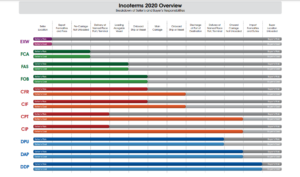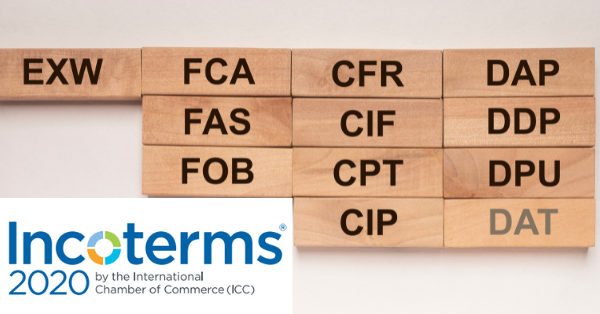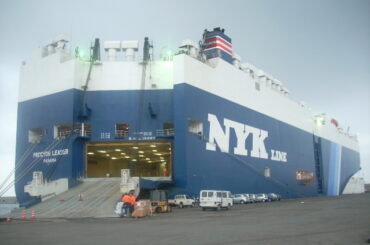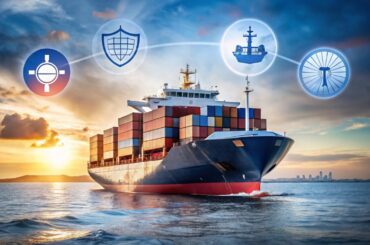Incoterms 2020
The International Chamber of Commerce has issued new Incoterms 2020, which go into effect on January 1, 2020. The ICC first released Incoterms® in 1936 and has continued to update them to reflect developments in the global trade environment. It is critical that all parties participating in the trade fully comprehend the developments and how they affect global supply networks.
1. What are Incoterms?
Incoterms or International Commercial Terms are the most important global commodity trading conditions published by the International Chamber of Commerce. The process of the purchase order to the creation of documents to the port of origin, Incoterms should be used. Therefore this is a set of terms that guide individuals who involve in the Import and Export procedure of International trade.
2. Changes in Incoterms
- DAT changed as DPU
DAT stands for Deliver at Terminal. This is interchanged by DPU, which indicates Delivery at Place. Furthermore, after the goods are unloaded at the agreed destination, the seller delivers the goods and the risk is transferred to the buyer. Import customs clearance and related costs shall be borne by the buyer. DPU is basically a DAP and Goods are supposed to unload and deliver o the place. The terminal link has been removed to make it more versatile.
- Change of Insurance. (CIP/CIF)
Under CIF/CIP terms, the seller purchases insurance for the buyer. In Incoterms® 2010, Clause C requires insurance, but in Incoterms® 2020, CIP requires insurance under the terms of Cargo Institute (A), and CIF requires insurance under clause C. Since Clause A is higher and more comprehensive insurance (such as industrial products), the lower level of coverage of Clause C may be applicable to the commodities sector.
- Costs clarification
To be mentioned, all costs are listed in the “cost allocation section” of each rule to avoid confusion. Since the order of the elements in the Incoterms 2020 rules has also changed, these elements are now displayed in the A9 / B9 section of each rule, which was a crucial issue Incoterms® 2010. careers often change their pricing structure to handle additional terms, and sellers are often surprised to additional payment criteria’s. (Terminal handling charges) Incoterms now calculates costs based on principles designed to clearly state the cost of each part.
Security requirements
Since September 11, 2001, cargo safety plays a vital role in sea transportation, and the 2020 regulations now contain many safety requirements that were very common at the beginning of this century. Regarding transportation requirements.
FCA & FOB
According to Part B4 of the FCA, the buyer must sign a contract or arrange the transportation of the goods at his own expense. There is a transportation gap between FCA and FOB.
If you sell FCA, your shipping point is different from FOB. For the seller, the difference between FCA and FOB lies in the huge costs and risks involved.
In the 2010 Incoterms rules, exporters of containerized goods are recommended to use FCA, which seems to be the best for both parties. However, many people use FOB when they should use FCA.
Most sellers use FOB as the standard Letter of credit and need to provide an onboard bill of lading. As a result, sellers often take risks and switch to FOB because they want to be paid according to terms and conditions. The FCA Incoterms® 2020 supplementary regulations now stipulate that if the two parties reach an agreement, the buyer must instruct the freight forwarder to issue a shipping document to the seller at the buyer’s expense and risk to confirm that the goods have been shipped (for example, Bill of Lading with an onboard notation)”
3.Incoterms 2020
1. Cost, insurance and Freight (CIF)
CIF refers to the seller’s delivery when the goods destined for export are properly packaged and safely loaded on the ship at the selected port of shipment. According to the contract of transportation and insurance, the seller is obliged to pay in advance. After the destination port is selected and the goods are safely loaded on the ship, the responsibility for the goods is transferred to the buyer. Sellers only need to have minimal insurance. This minimum level of coverage usually does not apply to products being manufactured. Buyers and sellers can agree on a higher level of insurance.
2. Carriage and Insurance Paid To-CIP
CIP means that the seller delivers the goods to the carrier or other authorized person (at the choice of the seller) at the agreed place. The seller bears the freight and insurance costs required to transport the goods to the selected destination. CIP stipulates that although the seller is responsible for freight and insurance when the carrier accepts the goods, the risk of damage or loss of the transported goods is transferred from the seller to the buyer. Insurance coverage If the buyer wants additional insurance, he is responsible.
3. Cost and Freight- CFT
CFR means that the seller delivers the goods when they are properly packaged and approved for export when they are safely loaded on the ship at the agreed port of shipment. The seller is responsible for the pre-paid freight contract. The responsibility for this is transferred to the buyer, even if the seller pays the cost of the contract of carriage to the chosen port of destination. The buyer must be notified before delivery in order to purchase insurance.
4. Carriage Paid To-CPT
CPT means that the seller delivers the goods to the carrier or a person designated by the seller to the destination agreed by the buyer and the seller. The seller shall bear the freight for transporting the goods to the designated location. … When the goods are handed over to the carrier, the responsibility for transporting the goods is transferred from the seller to the buyer. If multiple forwarders are used, when the goods are handed over, the risk is transferred to the first forwarder. The seller’s full responsibility is to organize delivery to the destination. He is not responsible for insuring the transportation of goods during transportation. The seller must clearly state in its quotation that its responsibility for the goods ends with the download, and the buyer must purchase appropriate insurance from that point in time.
5. Delivered at Terminal-DAT
DAT is the term used by the seller for delivery when unloading at the destination terminal. “Terminal” can refer to other parts of a container yard, wharf, warehouse, or freight terminal. It is easy to secure the location. Although there is no compulsory insurance, the delivery of the goods is considered complete only after the goods are unloaded at the agreed destination. Therefore, the seller must understand the possible risks of cancelling the insurance.
6. Deliver at Place-DAP
DAP means that the seller delivers the goods to the designated destination for unloading, and the buyer is responsible for customs clearance and import duties or taxes. Although there is no insurance obligation, delivery will not occur. It is not completed until the goods are unloaded at the agreed destination, so the seller must understand the risks associated with the cancellation of insurance.
7. Delivery Duty Paid-DDP
DDP means that the seller delivers the goods to be imported and unloaded to the buyer at the agreed place or destination, and the seller is responsible for all costs and risks related to the transportation of the goods to that place. Including the cost of pre-shipment inspection and import duties of the destination country. Insurance, the goods will only be shipped after the goods are unloaded at the destination, so the seller must be aware of the risk of not having insurance.
8. Ex works-EXW
Ex Works implies that the seller shall deliver the items as soon as they are made accessible to the customer at the seller’s or another designated location (e.g. factory, plant, warehouse, etc.). The seller is not required to put the goods into a collection vehicle or clear the goods for export.
9. Free Alongside Ship-FAS
FAS means that, if the seller delivers the correctly packaged product that has been approved for export, it will place it next to the ship at the agreed port of shipment. At this stage, the responsibility for the goods is transferred from the seller to the buyer. Responsible for the freight and any ancillary costs of the goods. The seller can obtain the charter party at the buyer’s request, or if the buyer does not obtain the contract before the scheduled delivery date, the seller can take the initiative to obtain the contract. You are responsible for the costs and risks associated with the freight contract.
10. Free Carrier-FCA
FCA means that if the goods are properly packaged and delivered to the carrier, the authorized person selected by the buyer, or the buyer at the place designated by the buyer, the seller will fulfil its delivery obligation. Transfer from the seller to buyer at the designated location. The location of the seller can be agreed as the location. Although the seller is responsible for loading the goods, the seller is not responsible for unloading the goods if the goods are delivered to an agreed place other than the seller’s location. The seller can purchase the charter party at the buyer’s request, or, if the buyer does not receive it within the scheduled delivery time, the seller can actively purchase the contract. The seller bears the costs and risks of this freight contract. The seller must immediately notify the buyer of the delivery conditions so that the buyer can insure.
11. Free On Board – FOB
FOB means that the seller properly packs the goods and sends them for export after they are safely loaded on the ship at the agreed port of shipment, and is responsible for transferring the goods to the buyer. The contract is concluded at the buyer’s request, or if the buyer cannot obtain it within the scheduled delivery time, the seller can obtain it on its own initiative. The buyer bears the costs and risks of this freight contract. Timely notify the buyer of the method of transportation for transportation insurance. FOB is a misused term. If the supplier insists that FOB is required for containerized goods, the buyer must ensure that the selected insurance will cover the goods.








